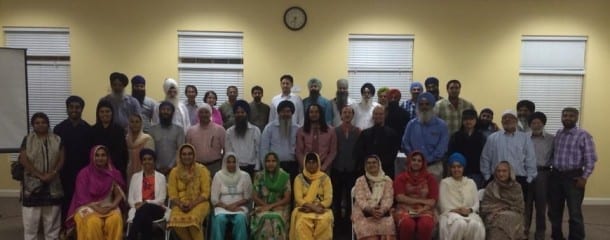Voices for India’s oppressed classes gather to remember Jaswant Singh Khalra’s disappearance
SAN JOSE, California, USA—Sikhs, Christians, Muslims, and African American leaders commemorated the 20th anniversary of the disappearance of Punjabi human rights activist Jaswant Singh Khalra in a seminar hosted on Sept. 26, 2015 at San Jose Sikh Gurdwara, one of the largest outside of India.
Organization for Minorities of India (OFMI) welcomed speakers to revisit the condition of human rights and religious freedom in India. Over a hundred attended the seminar sponsored by a collaboration of Indian American Muslim Council, Ensaaf, Incarnation Anglican Church (ACNA), and Sikh Information Centre.
As Indian Prime Minister Narendra Modi toured Silicon Valley, leaders from India’s various diaspora and refugee communities recounted the nation’s oppressive policies toward minority populations. Themed around the memory of Jaswant Singh Khalra, the annual event continues as a way to honor the murdered human rights activist. The conference featured Khalra’s daughter, Navkiran Kaur, who considers her father a martyr for the cause of persecuted Sikhs throughout India.
Jaswant Singh Khalra was murdered by the Indian government for uncovering and reporting that Indian police were secretly rounding up Sikhs in Punjab to torture, kill, and then cremate their bodies at local cremation grounds. In Amritsar alone, Jaswant identified the names of 2,097 Sikhs who were secretly cremated after being murdered by Indian police. On September 6, 1995, he was himself disappeared.
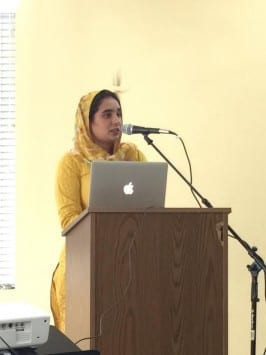

 “In 1995, my father was picked up by the Indian government – that was the last time we saw him,” explained Kaur. She also spoke about her father’s legacy and the history of the Khalra family, from her great-grandfather Harnam Singh’s involvement in the Stockton-based Ghadar Independence Movement all the way to her father’s last speech, given in Canada in an attempt to interest an international audience in the genocide happening in Punjab.
“In 1995, my father was picked up by the Indian government – that was the last time we saw him,” explained Kaur. She also spoke about her father’s legacy and the history of the Khalra family, from her great-grandfather Harnam Singh’s involvement in the Stockton-based Ghadar Independence Movement all the way to her father’s last speech, given in Canada in an attempt to interest an international audience in the genocide happening in Punjab.
Although convictions of five junior officers were upheld by India’s Supreme Court in 2011, Navkrian stated: “Justice for us is not what we are seeking from the Indian judicial system. We are not seeking for any kind of a compensation. We want accountability. We want those people who ordered everything to be held accountable.”
She especially challenged young women in particular to speak out by documenting and reporting human rights abuses.
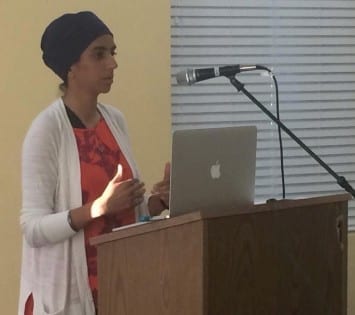

 Speaker Jaskaran Kaur, co-director of the human rights organization Ensaaf, began with a short video testimony of a man beaten and tortured near death by government police in India. Ensaaf’s work in Punjab aims to fully document the accounts of torture and murder experienced by Indian minorities by government police. “These killings are a way of silencing human rights work, silencing those who report on abuses or stand up for the victims,” said Jaskaran. “This is India’s way of controlling the narrative on fundamental rights.” She emphasized that proper education on this issue is key to effecting change in international forums and media.
Speaker Jaskaran Kaur, co-director of the human rights organization Ensaaf, began with a short video testimony of a man beaten and tortured near death by government police in India. Ensaaf’s work in Punjab aims to fully document the accounts of torture and murder experienced by Indian minorities by government police. “These killings are a way of silencing human rights work, silencing those who report on abuses or stand up for the victims,” said Jaskaran. “This is India’s way of controlling the narrative on fundamental rights.” She emphasized that proper education on this issue is key to effecting change in international forums and media.
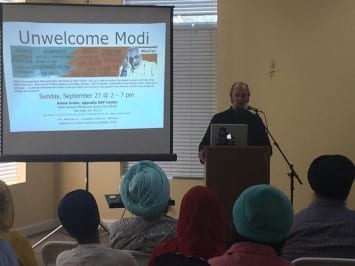

 Father Joshua Lickter, Vicar at Incarnation Anglican Church, urged unity among oppressed communities. Quoting from Martin Niemöller’s “First They Came” poem, Fr. Lickter emphasized the reality once experienced by those who refused to stand with the Jews in the Second World War as he read: “Then they came for me, and there was no one left to speak for me.” The Christian priest called on “Christians of all backgrounds and all traditions to stand up for the rights of our brothers and sisters who are being persecuted in India right now.” Highlighting the plight faced by other religious minorities, he also urged Christians to “forge new alliances with members of other faith communities whether they are Sikhs, Muslims or even atheists.”
Father Joshua Lickter, Vicar at Incarnation Anglican Church, urged unity among oppressed communities. Quoting from Martin Niemöller’s “First They Came” poem, Fr. Lickter emphasized the reality once experienced by those who refused to stand with the Jews in the Second World War as he read: “Then they came for me, and there was no one left to speak for me.” The Christian priest called on “Christians of all backgrounds and all traditions to stand up for the rights of our brothers and sisters who are being persecuted in India right now.” Highlighting the plight faced by other religious minorities, he also urged Christians to “forge new alliances with members of other faith communities whether they are Sikhs, Muslims or even atheists.”


 “We cannot allow our religious differences to be exploited,” said Umar Malick, President of the Indian American Muslim Council, while speaking at the San Jose conference. “Islamophobia is being utilized by the Indian state to target and silence minorities.” In 2002, 2,000 Muslims were massacred by Hindu mobs and over 150,000 displaced in Gujarat, India. Malick encouraged participants to join him the following day to protest Prime Minister Modi’s visit in San Jose. Modi was the Chief Minister of Gujarat during the 2002 genocide, and internal reports later surfaced that Narendra Modi ordered Gujarati police not to halt the bloodshed or aid the victims. In 2005, when Modi applied for a visitor’s visa to the United States, the State Department took swift action in denying him entry to the US based on his involvement in the attacks.
“We cannot allow our religious differences to be exploited,” said Umar Malick, President of the Indian American Muslim Council, while speaking at the San Jose conference. “Islamophobia is being utilized by the Indian state to target and silence minorities.” In 2002, 2,000 Muslims were massacred by Hindu mobs and over 150,000 displaced in Gujarat, India. Malick encouraged participants to join him the following day to protest Prime Minister Modi’s visit in San Jose. Modi was the Chief Minister of Gujarat during the 2002 genocide, and internal reports later surfaced that Narendra Modi ordered Gujarati police not to halt the bloodshed or aid the victims. In 2005, when Modi applied for a visitor’s visa to the United States, the State Department took swift action in denying him entry to the US based on his involvement in the attacks.
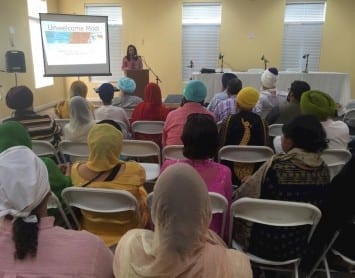

 Jada Bernard from OFMI continued with a discussion on the effect of institutional discrimination based on race, ethnicity, or religion. “You have no choice whether you were born female, Dalit, or black so that means that these things were chosen for us by God,” Bernard said. “Therefore these things are sacred. That means that these are things we must embrace, not things that should marginalize us.” Bernard also compared modern Hindu nationalism to the white supremacy excoriated by African American leaders like W.E.B. DuBois and noted the connection between anti-caste leaders like Dr. B. R. Ambedkar and the Harlem Renaissance movement.
Jada Bernard from OFMI continued with a discussion on the effect of institutional discrimination based on race, ethnicity, or religion. “You have no choice whether you were born female, Dalit, or black so that means that these things were chosen for us by God,” Bernard said. “Therefore these things are sacred. That means that these are things we must embrace, not things that should marginalize us.” Bernard also compared modern Hindu nationalism to the white supremacy excoriated by African American leaders like W.E.B. DuBois and noted the connection between anti-caste leaders like Dr. B. R. Ambedkar and the Harlem Renaissance movement.
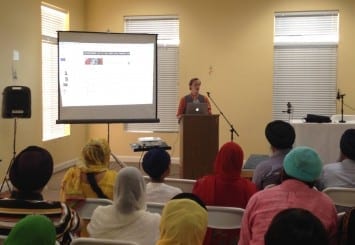

 Finally, Pieter Friedrich from Sikh Information Centre gave a slideshow presentation surveying the historic oppression of religious and ethnic minorities in India. Moving from India’s record on censoring free speech to a proposed national ban of beef products and widespread acceptance of barbaric colonial laws, Friedrich emphasized: “Indian citizens possess no liberty that cannot be taken away by the government at whim.” Referencing the political protests of both Bapu Surat Singh Khalsa and Irom Sharmilla alongside India’s refusal to sign the United Nation’s Convention Against Torture, he added: “India has no law prohibiting torture. You can basically say that torture in India is legal.” Stressing the importance of continuing efforts to bring attention to the oppression in India, he said afflicted areas includes not just Punjab, but also Kashmir, Orissa, Gujarat, Manipur, and other regions where state terrorism flourishes.
Finally, Pieter Friedrich from Sikh Information Centre gave a slideshow presentation surveying the historic oppression of religious and ethnic minorities in India. Moving from India’s record on censoring free speech to a proposed national ban of beef products and widespread acceptance of barbaric colonial laws, Friedrich emphasized: “Indian citizens possess no liberty that cannot be taken away by the government at whim.” Referencing the political protests of both Bapu Surat Singh Khalsa and Irom Sharmilla alongside India’s refusal to sign the United Nation’s Convention Against Torture, he added: “India has no law prohibiting torture. You can basically say that torture in India is legal.” Stressing the importance of continuing efforts to bring attention to the oppression in India, he said afflicted areas includes not just Punjab, but also Kashmir, Orissa, Gujarat, Manipur, and other regions where state terrorism flourishes.
Sukhdev Singh Bainiwal, representing the San Jose Sikh Sangat, thanked the speakers and participants for attending the conference. The event ended with dinner provided by the Gurdwara Sahib San Jose in the facility’s Langar Hall.

